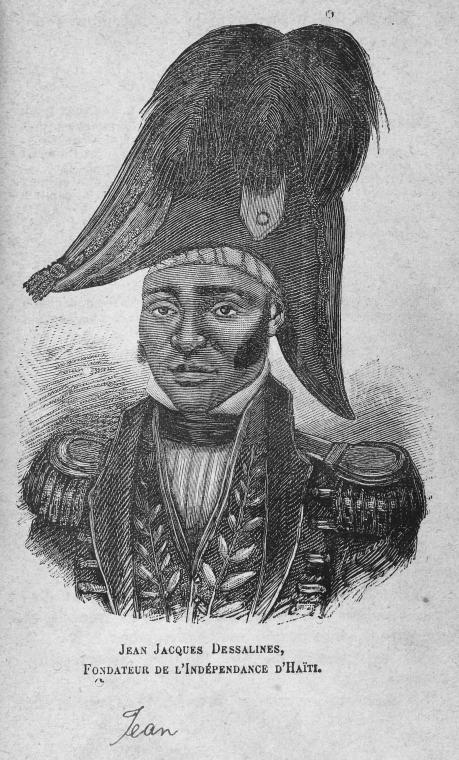
“Jean Jacques Dessalines, fondateur de l’Indépendance d’Haïti,” in Dantès Fortunat, Nouvelle géographie de l’île d’Haïti, contenant des notions historiques et topographiques sur les autres Antilles, H. Noirot, 1888. Source: New York Public Library (Click Image)
The July 2012 issue of the William and Mary Quarterly is hosting a special forum on “Jean-Jacques Dessalines and the Haitian Revolution.” The forum includes:
Laurent Dubois, “Dessalines Toro d’Haiti.”
Philippe R. Girard, “Jean-Jacques Dessalines and the Atlantic System: A Reappraisal:”
Revered in Haiti as a founding father committed to his countrymen’s freedom and independence, decried by his white contemporaries as a bloodthirsty brute, Haitian revolutionary Jean-Jacques Dessalines was actually a multifaceted historical figure who borrowed much of his worldview and many of his policies from the colonial plantation system of the Atlantic world. In particular, archival findings in France, Britain, and the United States reveal that Dessalines encouraged France to arrest fellow black revolutionaries, was long ambivalent about advocating independence from France, and maintained close relations with some white Frenchmen even after the 1804 massacres. He conducted extensive diplomatic negotiations with his neighbors in an effort to maintain the trade links inherited from the colonial era, strove to preserve the integrity of the sugar plantations even though he had himself been a slave (probably of Toussaint Louverture’s son-in-law), enforced a strict feudal system among former slaves and tried to import African laborers, and was inspired by a multicultural environment that incorporated American and European as well as African elements. Dessalines was thus a complex character whose conduct was motivated by his economic, political, and diplomatic interests in addition to the racial and ideological factors that tend to dominate the historiography.
Julia Gaffield, “Haiti and Jamaica in the Remaking of the Early Nineteenth-Century Atlantic World:”
The Haitian Declaration of Independence on January 1, 1804, explicitly challenged long-standing systems of European colonialism and slavery in the Caribbean. In the complex diplomatic and economic negotiations between Haiti’s first leader, Jean-Jacques Dessalines, and the lieutenant governor of Jamaica, George Nugent, the two sought to answer unprecedented questions in the months before and after Dessalines’s rebel forces defeated the French army. Nugent considered how British officials would regulate trade between British merchants and Haitians but was concerned that Haitian merchants and sailors would spread the spirit of rebellion throughout the New World. Could slavery and universal freedom coexist in the Caribbean without dramatic consequences for the British Empire? The full documentary evidence of how both sides aggressively pursued their objectives during 1803 and 1804 casts a new light on why Atlantic world empires and nations settled on policies of diplomatic isolation for Haiti by the end of the first decade of the nineteenth century. The Haitian Declaration of Independence raised profound questions about revolutionary legitimacy and national sovereignty and drastically expanded the ideals of the age of revolutions.
In “Sources and Interpretations,” Deborah Jenson, “Jean-Jacques Dessalines and the African Character of the Haitian Revolution:”
According to the standard interpretation of mid- to late twentieth-century historiography, Jean-Jacques Dessalines was literally Creole—born in the colony—yet performatively and ideologically African. The vexed narrative of the origins of the first leader of independent Haiti shapes our understanding of the Haitian Revolution as what Laurent Dubois calls “an African revolution,” whose African-born majority is only obliquely reflected in the historiography of revolutionary leadership. Analysis of sources and interpretations reveals that the few individuals from Dessalines’s lifetime who spoke of his background at all described him as African-born. Some accounts traced his origins to the “Gold Coast” (in its eighteenth-century French acceptation), and others alluded to his tribal scarification. Political tensions over Haitian elites and their relationships to the nonelite majority heralded the gradual transition from the African to the Creole narrative of Dessalines’s origins in the middle of the nineteenth century. The possibility that Dessalines was not Creole but African represents a critical link for renewed theorization of how the Middle Passage informed African revolutionary agency in colonial Saint Domingue. The oral traditions of Vodou provide a valuable source of alternative historiography for study of the African character of the Haitian Revolution.
Read the entire issue online through JSTOR Current ($$).